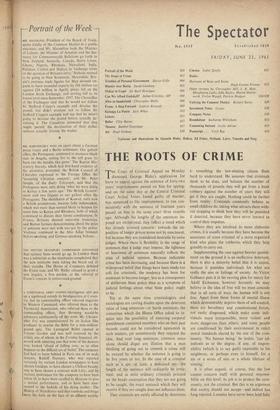Portrait of the Week
MR. MAUDLIN°, President of the Board of Trade, spoke kindly of the Common Market in a public utterance, and Mr. Macmillan bade the Minister cif Labour, the Minister of- Aviation and the Sec- retary for Commonwealth Relations go forth to New Zealand, Australia, Canada, Sierra Leone, Ghana, Nigeria, Rhodesia, Nyasaland, India, Pakistan, Ceylon and Malaya to 'exchange views on the question of Britain's entry.' Nobody seemed to be going to New Brunswick. Meanwhile. Brit- ain's overseas trade figures for May showed im- ports to have exceeded exports by £84 million (as against £24 million in April); prices fell on the London Stock Exchange; and sterling fell to its lowest level since September. 1957. The Chancellor of the Exchequer said that he would not follow Sir Stafford Cripps's example and devalue the pound, but didn't promise not to follow Sir Stafford Cripps's example and say that he wasn't going to devalue the pound before actually de- valuing it. The Canadians intimated that they might 'permit' the devaluation of their dollar, without actually forcing the matter.
MR. KHRUSHCHEV went on again about a German peace treaty and a Berlin settlement. Our gallant allies, the Portuguese, continued to massacre black men in Angola, setting fire to the tall grass 'to burn out the bandits like game.' The Baptist Mis- sionary Society, which had first-hand evidence of the atrocities, protested; the British Council of, Churches expressed to the Foreign Office the `mounting Christian concern'; and Mr. Peter Simple, of the Daily Telegraph, said that the Portuguese were only doing 'what we were doing in Kenya a few years ago.' The British Govern- ment sold two frigates to our gallant allies the Portuguese. The sheikhdom of Kuwait. until now a British protectorate, became fully independent, which was more than seemed likely to happen for some time to Kenya and Rhodesia. both of which continued to discuss their future constitutions. In France, Brittany showed separatist tendencies. and Breton farmers demonstrating about the price of potatoes were met with tear-gas by the police. Violence continued in the Alto Adige between Italian-speaking and German-speaking Italians.
*
BRITISH TRANSPORT COMMISSION announced that railway fares would go up. In London there was a minicrisis as the maxitaxies complained that the new minicabs were taking the bread out of their mouths. The House of Commons debated the Evans case, and Mr. Butler refused to grant a new inquiry, a free pardon, or the reburial of F.vans's remains in consecrated ground.
A TERRITORIAL. ARMY counter-intelligence unit put up a signboard outside its headquarters at Coven- try, but its commanding officer referred inquiries to Western Command, who referred them to the Territorial Association, who referred them to the commanding officer, thus throwing would-be saboteurs satisfactorily off the scent. Mr. Christo- pher Fry was commissioned by an Italian film producer to rewrite the Bible for a nine-million- pound epic. The Leningrad Ballet opened at Covent Garden and was well received by the critics, one of whom, in the Evening Standard, ob- served with admiring awe that none of the dancers ever looked `afraid of falling over, as so often happens in the difficult art of ballet.' The company had had to leave behind in Paris one of its male dancers. Rudolf Nureyev, who was reported variously by various London newspapers to have chosen freedom, to have chosen a Chilean beauty, ana to have chosen a contract with Lifar, and by various spokesmen for the company to have been taken ill, to have been recalled to Moscow to give a special performance, and to have been sum- moned to the bedside of his dying mother. The Bishop of Manchester said that tombola and bingo were the boils on the face of an affluent society.


































 Previous page
Previous page